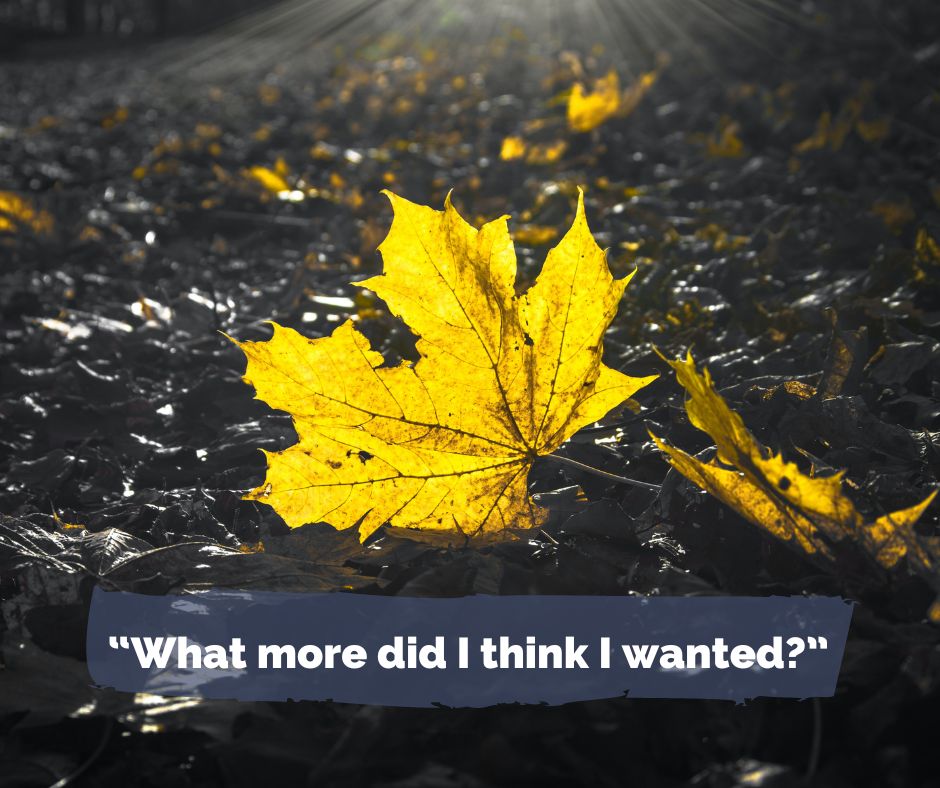The Yellow Falling Leaf
Question One: What more did I think I wanted?

We don’t think of Ash Wednesday as a time to reflect on happiness. Isn’t it about sackcloth and guilt? But Ash Wednesday is set apart simply as a day to ponder this one fact: We came from dust, and we return to dust. When we accept this fact, we are ready for happiness. Sound crazy? Try to think of one person who’s had a near-death experience and comes back glum or depressed. They all come back radiant, on fire, because they know about the dust.
Listen to the poet, deeply troubled, taking a prayer-walk through the woods:
Again I resume the long lesson:
how small a thing can be pleasing,
how little in this hard world it takes
to satisfy the mind and bring it to its rest.
Within the ongoing havoc
the woods this morning is almost unnaturally still.
Through stalled air, unshadowed light,
a few leaves fall of their own weight.
The sky is gray.
It begins in mist almost at the ground
and rises forever.
The trees rise in silence
almost natural, but not quite,
almost eternal, but not quite.
What more did I think I wanted?
Here is what has always been.
Here is what will always be.
Even in me,
the Maker of all this returns in rest,
even to the slightest of His works,
a yellow leaf slowly falling,
and is pleased.
– Wendell Berry (from 1999, part VII)
“In the midst of the havoc”—the chaos we all live—the poet is walking the woods, and the mist and the rising trees transport him to a place of deep knowing. “Here is what has always been. Here is what will always be.” In that flash of insight he asks, “What more did I think I wanted?” At peak moments like this, when for a brilliant instant we see what’s real and true, what lasts forever, we all wonder—smacking our foreheads—What more did I think I wanted?
What more? I’ll tell you what more. I wanted to run fast enough to escape my childhood past. I wanted to be more important. After all those fights from twenty and thirty years ago, I wanted to be vindicated. I wanted to live forever.
The yellow leaf falls into the humus and disintegrates as ash, and everything we need is here, has always been here.
Question for Today:
“What more did I think I wanted?”
I shared some of what’s on my list—the “more” I thought I needed to be happy. What is on yours?
Question #2 “What is sin, really?” comes Sunday February 26th
David, your writings always bring peace. They lead us to think beyond ourselves, yet to search our own being. All to better ourselves for others and for God. What a blessing you are to so many.
Thanks, Jan
I’d say the “more” I wanted was not only to walk the path God opened for me, but to have it look like what I expected it would. And it never looks like what I expect it will…Peace, Johnna
So true–you’re singing my song.
I wanted to be free of doubt.
I wanted to be doubt-free.
I wanted a doubt-free faith.
It ain’t gonna happen. I’m 74. Nope. Not happening.
I’m OK with that. It’s like gravity. Like aging.
And I say, OK. Then choose to look away–at dozens of lovely things.
In my list of “mores” I didn’t think of this whole faith experience–thanks for saying something many of us are also feeling.
My fellow Michael, you probably know this line from Paul Tillich. It’s one that I rely on: “The opposite of faith is not doubt. It’s certainty.’
We’ve turned biblical faith, which is always about trusting even though we can’t know for certain–into its opposite: certainty. That “sells” better, but it can’t save a mouse.
I open up one hand, that I thought held the “more” (no, I knew) I wanted – but it wasn’t to be, and then I open the other hand and out pours the abundance of what I have receieved, and somehow sadness and joy are companions. It’s mysterious and amazing. I don’t understand it, but I’m thankful.
Beautifully expressed–how both of those hands hold our life, and we’re better off when we stop trying to choose and manage which hand we’re going to get. It’s both and it’s all right.
David this is so perfect, and I love this Wendell Berry poem. I’ve been thinking about writing about the “disease of more” which is quite a thing for people in recovery to deal with. (Or anyone really). And I will link to this post!
As soon as you mentioned people in recovery, I thought–Yes, that group of people really know about the ruin of a life committed to more and more and more. (I just finished Wendell Berry’s novel “Jayber Crow”–I think you’d love it!)
I’ll have to read Jayber Crow! Thank you. I loved “The Memory of Old Jack.”
David,
This is the best – and what I needed for Lent. Thank you.
I am not a poet, but these words popped into my head after reading ur thoughtful words. What I want is not to be, the ones I loved and lost to Thee. A chance to right the wrongs I’ve done, It can’t happen, but forgiveness is free. I want to be a better me, A me who can love unconditionally.
I want to be worthy of all God’s blessings, to see the world in it’s gorgeous dressing. What I want is just a dream. What I need is just love Supreme.
On the contrary, Susie–you ARE a poet. Thank you for that.